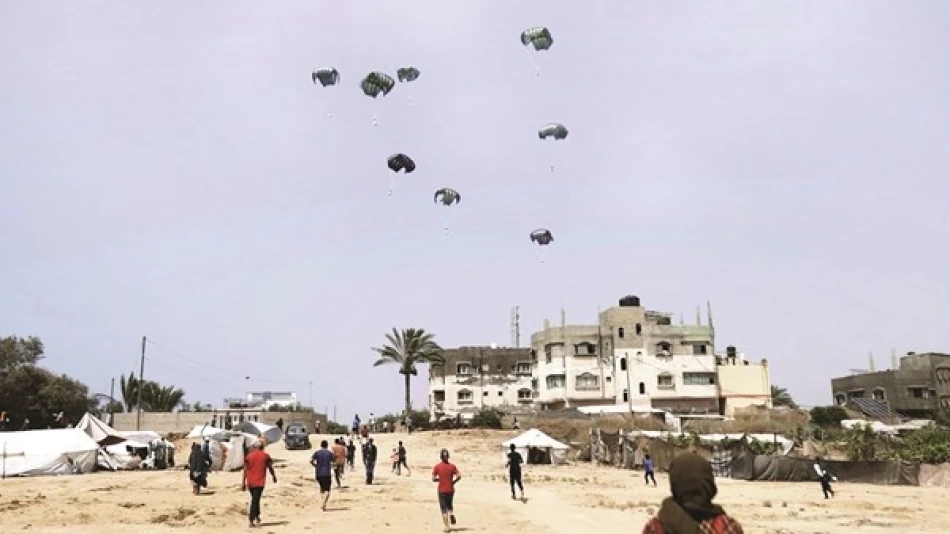
Palestinian Experts and Officials Praise UAE's Humanitarian Aid for Gaza Residents
UAE Emerges as Gaza's Top Humanitarian Donor, Delivering Over $1.5 Billion in Critical Aid
The United Arab Emirates has positioned itself as the leading international donor to Gaza, providing more than $1.5 billion in humanitarian assistance through strategic initiatives that have helped prevent widespread famine and supported hundreds of thousands of Palestinian families during one of the region's most severe humanitarian crises.
Record-Breaking Aid Commitment Sets Global Standard
According to the UN Office for the Coordination of Humanitarian Affairs (OCHA), the UAE now tops the list of international donors to Gaza, surpassing traditional aid powerhouses through a combination of direct food assistance, field hospitals, and water desalination infrastructure projects.
The scale of UAE's commitment reflects a broader shift in Middle Eastern humanitarian diplomacy, where Gulf states are increasingly taking leadership roles in crisis response. This approach mirrors similar strategies employed by Qatar during regional conflicts and demonstrates how oil-wealthy nations are leveraging their resources for soft power projection.
Multi-Pronged Relief Strategy
The UAE's humanitarian approach centers on three major initiatives: "Gallant Knight 3," "Birds of Goodness," and direct infrastructure development. These programs have focused on immediate food security, medical care, and long-term water access solutions.
Imad Mohsen, spokesperson for the Democratic Reform Movement within Fatah, emphasized that UAE efforts have been "pivotal in meeting basic needs" and represent crucial support for regional and international efforts to combat widespread hunger among Palestinian families.
Operational Success Despite Complex Logistics
Palestinian researcher Mahmoud Shaker Siam highlighted the UAE's ability to maintain consistent aid delivery even under the most challenging circumstances. The country has ensured community kitchens receive essential food supplies and contributed flour quantities to keep bakeries operational, directly addressing hunger in the besieged territory.
The coordination between UAE and Egypt has proven particularly effective, with both nations continuing support despite logistical obstacles that have hampered other international aid efforts. Their joint approach includes food and medical convoys alongside strategic airdrops that have reached displaced populations and residents in isolated areas.
Measurable Impact on Food Security
The UAE initiatives have demonstrably reduced famine risk and helped moderate food prices during a period when malnutrition rates among children and elderly populations reached dangerous levels. This intervention came as health officials documented the first cases of hunger-related deaths, making the timing of increased aid flows particularly critical.
Strategic Implications for Regional Humanitarian Leadership
The UAE's humanitarian leadership in Gaza represents more than emergency response—it signals a strategic approach to regional influence that could reshape how Gulf states engage with Palestinian issues. Unlike previous decades when Saudi Arabia dominated Arab aid efforts, the UAE's systematic, well-publicized assistance demonstrates how smaller Gulf states can achieve outsized diplomatic impact through targeted humanitarian investment.
This approach aligns with the UAE's broader foreign policy strategy of building practical relationships across traditional regional divides, potentially creating sustainable channels for future crisis response regardless of political developments.
Long-Term Infrastructure Focus
Beyond immediate relief, the UAE's investment in water desalination facilities and medical infrastructure suggests a commitment to Gaza's long-term recovery capacity. This infrastructure-focused approach differs from traditional humanitarian aid models and could provide a template for post-crisis reconstruction efforts.
Palestinian officials have indicated that Gaza's collective memory will preserve recognition of nations that provided support during this crisis period, suggesting the UAE's humanitarian investment may yield lasting diplomatic dividends in future regional negotiations and relationships.
Most Viewed News

 Layla Al Mansoori
Layla Al Mansoori






